The Hunchback of Notre Dame @ 25: The first movie I ever saw
 Monday, June 21, 2021 at 11:00PM
Monday, June 21, 2021 at 11:00PM 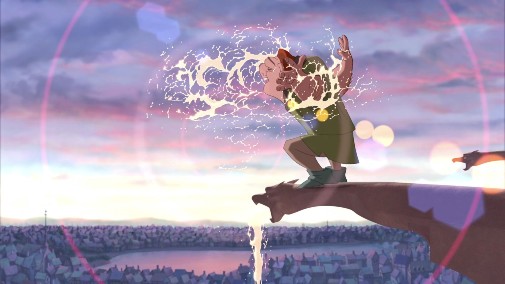
Do you know what the first movie you watched in a theater was? While I have no memory of the event, my parents were kind enough to remember my inaugural trip to the movies. When I was just two, they took me to see the latest Disney flick to hit theaters, The Hunchback of Notre Dame (1996). Supposedly, I was besotted by the sight and, when the picture was released on VHS, proceeded to re-watch it to my heart's content. I still have that videocassette today, a treasured memento of childhood and a token of a kid's blossoming love for cinema. So today, as The Hunchback of Notre Dame turns 25, I revisited that underrated classic of the Disney Renaissance and see if I still loved it…
Victor Hugo and the House of Mouse don't seem like a very logical pair. Indeed, reading up on The Hunchback of Notre Dame's behind-the-scenes drama and examining the film, one can notice the tensions between source material and the Disneyfied veneer of the finished product. From a design, narrative, and even sonic standpoint, the film's an ungainly mixture of compromises and contradictions, a decidedly adult story being twisted out of shape to fit a standard entertainment model for the whole family. And yet, no matter how much the studio was interested in selling kids' entertainment, The Hunchback of Notre Dame remains a dark picture beneath the layers of gargoyle hijinks and slapped-on happy endings.
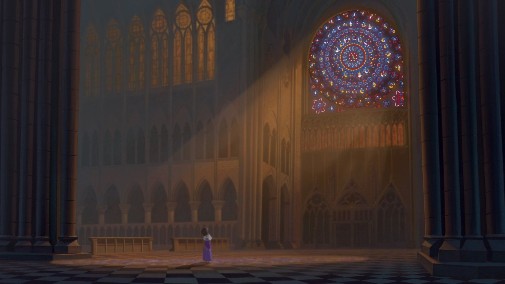
Something like 1985's The Black Cauldron may be more outwardly edgy in the context of Disney toons, but that's primarily adolescent affectation and a matter of cosmetics when compared to this 1996 musical. From its thunderous prologue, The Hunchback of Notre Dame is playing with sounds, imagery, and themes that transcend the fairytale fantasia of most Disney films of this period. No matter how much the 20-plus screenwriters changed from Hugo's novel, the story set in 15th-century Paris is still partially about Quasimodo, a deformed social outcast whose life is shaped by widespread prejudice and the influence of a crazed religious fanatic. Claude Frollo (how I hated to share a name with the villain when I was a kid) might have been a clergyman in the original text, but Disney made him a magistrate to avoid offending the church. This alteration wasn't a new invention, mind you, since it was already featured in the 1939 movie adaptation.
Nevertheless, the character's hypocritical purity remains strong in the cartoon, and the relentless hatred against the Gypsies of Paris became his principal character trait. That and his lustful obsession with Esmeralda, the only person to bestow Quasimodo with the kindness of a friend. Though the cosmic misanthropy of the 1831 novel was considerably sanded-off, the cruelties of this cartoon world are still viscerally felt. Watching Quasimodo be pummeled with produce by an angry mob is upsetting beyond words. Similarly, there's the spectacle of Esmeralda at the stake, flames surrounding her like molten gold falling upwards, all while Frollo grins at her through the smoke. No quantity of cheery talking gargoyles could hope to counterbalance that, no matter how brutishly they tried.
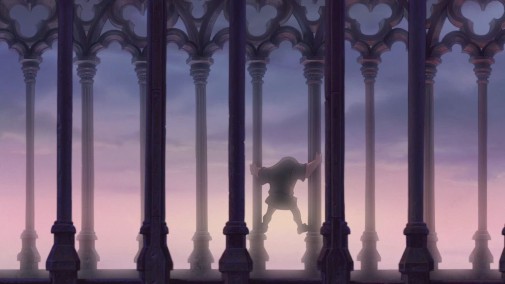
And that brings us to what's perhaps the most surprising part of the film. While Disney's The Hunchback of Notre Dame is not a faithful Victor Hugo adaptation, it is a functional story with well-rounded characters. Tonal incoherence aside, the House of Mouse dared to tackle a significant quantity of the complicated ideas that concerned the 19th-century writer whose artistic beliefs weren't necessarily in opposition to commerce or popular entertainment. More importantly, Disney perpetuated Hugo's mission in making people more interested in Notre Dame de Paris. Both novel and film are as much about Gothic architecture as they are about their characters. The edifice's wonder that the book immortalized with words is translated into movie magic by the possibilities of animated cinema.
The camera can fly through the cathedral's screen recreation with a sort of fluidity that's impossible in live-action movies. Hell, it's impossible in most animated films. Furthermore, there's a magnificent sense of scale that stems as much from technical precision as from Gary Trousdale and Kirk Wise's direction. The relationship of the individual to crowds, buildings, and cities is intrinsic to the movie's visual language. If not because of Disney's The Hunchback of Notre Dame, I might not have been as adamant about visiting the cathedral both times I was in Paris during my youth. After the fire that destroyed a good portion of the building in 2019, I'm incredibly thankful for those experiences. Furthermore, I doubt I'd have become so interested in Victor Hugo from an early age. In summary, I wouldn't be the same person as I am today and all because of beautiful animation.
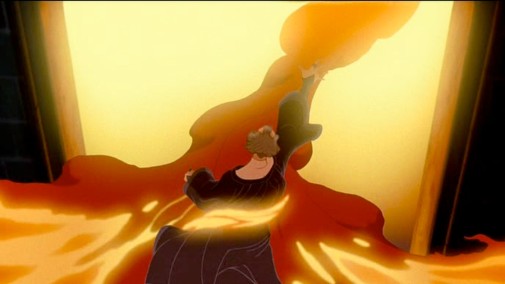
Still, even more monumental than the set design or camera movements, The Hunchback of Notre Dame is blessed with what I'll readily call Alan Menken's best musical compositions. The songs, co-written with lyricist Stephen Schwartz, aren't consistently superlative, but those that do work are spellbinding. Beyond them, the score is a miracle of Catholic liturgy woven together with Broadway-style grandeur. The result is frankly overwhelming. Even watching at home, I always feel goosebumps during the opening salvo of bell-ringing, the choral interruptions to Esmeralda's plea for God's mercy, and the climax of the "Sanctuary" track.
No exploration of The Hunchback of Notre Dame would be complete without mentioning its best musical number. As the last passages of the twinkling "Heaven's Light" bleed into Latin chant, Frollo takes center stage to perform one of Disney's best villain songs. "Hellfire" is a hymn of genocidal hatred erupting from a volcano of Catholic sexual repression. He lusts after what he cannot have, what he thinks is ignoble. Watching him debate with himself, a personal conscience that manifests as a sea of Cardinal-red shadows, one gets a sense of the warring tempest storming inside him. It's shockingly blatant, evoking prayer in the lyrics as well as the voluptuousness of temptation given form by flickering flame.
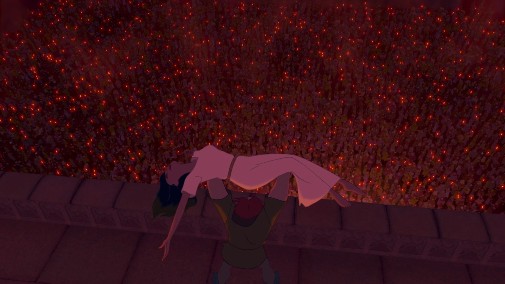
I don't think I fully understood the more adult aspects of the plot or its symbolism when I was a child, but I did perceive the strength, the truth, of the emotions. That's what exceptional visual storytelling and robust musical expression will do for you. Even audiences who don't get it immediately still understand the essence of the thing. In that regard, The Hunchback of Notre Dame transcends the basic valor of its cartoon provocation, its gutsiness, proving itself an awe-inspiring, if imperfect, work of art. It's interesting growing old alongside this favorite flick, becoming increasingly aware of the themes it hints at - the troubled history of the anti-Romani oppression throughout Europe, the horrors hidden behinds façades of religious piety, the ravages of desire that's muzzled and becomes rabid. Every time I re-watch it, I learn a new thing about it and myself. If that's not the mark of a great movie, I don't know what is.
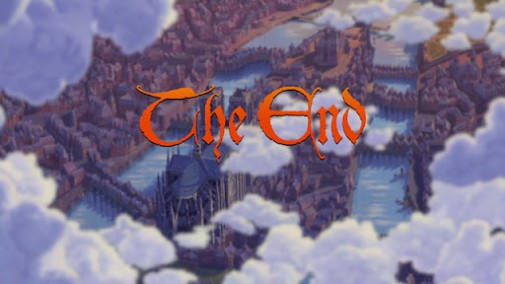
The Hunchback of Notre Dame is streaming on Disney+.



Reader Comments (18)
I loved this film. I remember Bette Midler's take on "God Help the Outcasts" over the end credits. The song was arranged by Midler's long-time collaborator Arif Mardin. And, what can I say... It sounds as if it had been written specially for her!
I am a huge Midler fan, and have followed her career since I first saw her in a 1973 Burt Bacharach Special. She sang Superstar and Boogie Woogie Bugle Boy... actually, it was Midler x 3!
The movie is not underrated. It's a minor Disney. Minor even than others considered minors, such as Pocahontas. But as with all 2-D animation of the studio, full of qualities. I prefer a minor 2-d animation than the best that can be done with the computer.
The first movie I ever saw was The Wizard of Oz. I am from the generation who revered the fantasy and fervently wished to go over the rainbow. In the days before streaming, all the children on the schoolyard knew the evening when Dorothy and the Wicked Witch would square off. My favorite character was the Witch. I thought she was thrilling.
Nothing, however, prepared me for the evening when my parents took me to a revival house to see the film on the big screen. When the door to the ramshackle home creaked open, I gasped at the stupendous color. I was thunderstruck, I had watched the film for years on a black and white television. I was completely unprepared for the amazing land of Oz. The yellow brick road was really yellow!
The magic of the movies captured my imagination that night. It has been a life long love affair ever since.
Claudio -- What a great first movie experience to have. I also dont remember my first movie and unfortunately my parents dont either. But back then Disney would rerelease things in intervals so maybe it was a Disney film.
Rafaello -- As for the movie itself... it has lots of problems so I kind of agree with you EXCEPT that in every way an animated movie can be major it is for a good 15 minute stretch or so around the HEAVENS LIGHT / HELLFIRE sequence... but it's too confused and compromised to sustain that enchantment.
Pity about the gargoyle comedy.
Great piece, Claudio!
In case this may be of interest, there was a recent piece on the Entertainment Weekly website about how Michael Jackson (!) wanted to voice the Hunchback. Unsurprisingly (and wisely), Disney was not having it.
Here's the link: https://ew.com/movies/hunchback-of-notre-dame-michael-jackson-songs-slashfilm/
My first movie was The Land Before Time, which I loved and still appreciate to this day.
As for THoND, it is one of 7 or so Disney animated movies I have never seen - it's never one of the ones people tell me to check out, so it kept getting pushed down the list. I'd be lying if I hadn't been curious before, but the criticisms have kept it on the 'maybe later' list whenever I go to knock out a Disney film I haven't seen.
I loved this film, which I first saw as an adult. In fact, I liked it better than Disney's BEAUTY AND THE BEAST. I was a bit taken aback when it became clear it was bombing relative to other Disney animated films of that era. The first film I remember being taken to was Disney's SLEEPING BEAUTY. I think it made me gay; It certainly gave me a phobia against fire breathing purple dragons. Not that you encounter them much in everyday life.
My first movie experience was Benji the Hunted... which I do not remember much of and have not revisited!
Big Hunchback fan, especially the music. The plot and tone are definitely all over the place but I think Disney would have been well-served to have more of their late-90s animation try to break the template and figure out how to evolve the form.
My sister told me that my parents took the whole family to see The Empire Strikes Back in a drive-in theater when I was a small baby. Apparently those at the back of our vehicle had a difficult time hearing the dialogue, especially when I fussed. I have no doubt my siblings wished they could turn me off like C3PO.
Everyone is right when they say that Hunchback is tonally inconsistent. It's basically whiplash. That being said, there are sequences so beautiful that I still think it's worth watching. Perhaps Disney should have committed to making this a purely adult film. The contradictions and imagery in some of the musical numbers (Heaven's Light/Hellfire, God Help the Outcasts, Bells of Notre Dame, Stay I Here/Out There) are really epic.
My first moviegoing experience was also with Gary Trousdale and Kirk Wise... but it was Beauty and the Beast (I was already obsessed with every VHS I had in my house by then, so my dad surprised me with my first trip to the cinema). One thing you can definitely say for both Beauty and the Beast and Hunchback is that they both feel like big-screen events. They both feel massive in scope and they look beautiful.
And yes, it's true Hunchback of Notre Dame is uneven, but it's great moments are GREAT and its not great moments are the stuff we know we stomach through for the kids in the audience (and given that I was 8 when I first saw Hunchback, I actually liked the gargoyles, though they are definitely off from the rest of the movie).
There was a good article on the same subject in the Times yesterday:
https://www.nytimes.com/2021/06/21/movies/the-hunchback-of-notre-dame.html
My first experience was Snow White and the Seven Dwarfs. Such a magical experience, especially the death of the evil stepmother, which scared the ever-lovin' crap out of me. I couldn't wait to see it again!
I honestly love this movie - one of the only disney films to scare me as a child. the hellfire sequence really shook me and, at night, i'd think i'd see Frollo's silhouette outside my door waiting for me. HORRIFYING.
anyway i think my first movie was The Sandlot?
Disney ruined my appreciation of their work with The Lion King and it escalated to my dislike towards Hunchback. My basic problem is that I don't want to know who is providing the voices of the characters. It seems like their went out of their way with Hunchback to let you know that Demi Moore (right off Indecent Proposal or Striptease) and Kevin Kline were providing the voices. With Disney animation, I want the characters to speak for themselves and I'd rather NOT know who is behind the screen.
The later generation of French writers tried to bury Victor Hugo - among other things because of the size he reached à la Charles Dickens in England and Mark Twain in America. And also because of his political positions. Honey, you just can't subdue a writer who's written The Hunchback of Notre-Dame, Les Misérables, The Man Who Laughs, among so many other works that deserve to be better known. The simple fact that they make an animation for children based on one of his works says a lot about VH importance. And his detractors, (among them, some of the greatest writers in universal literature) does anyone remember?
As for the animation, it's like two teams making their own version - one more "cute and childish" like Beauty and The Beast and the other trying something more "realistic" like Pocahontas. And without deciding on one or the other, they joined the two results in a film that doesn't make up its mind about what it wants to be. Some prefer the cute parts, others the realistic moments. There are interesting things and Disney's animations by hand are always worth a watch.
Nat: I mean, minor for Disney would be semi-revelatory for most other animation teams, especially at the time...? Imagine the exact same movie, but instead of Disney making it, its Don Bluth at Fox. That kind of changes how you'd perceive it, doesn't it?
I enjoyed this well enough when it came out, but it’s not one of the films I feel compelled to go back to. I did get to see the short-lived live stage show version at Disney World. Now that was a good time. So many puppets.
Fantastic piece! Such a lovely tribute to an underrated gem. I still can't believe Disney dared to go this dark.